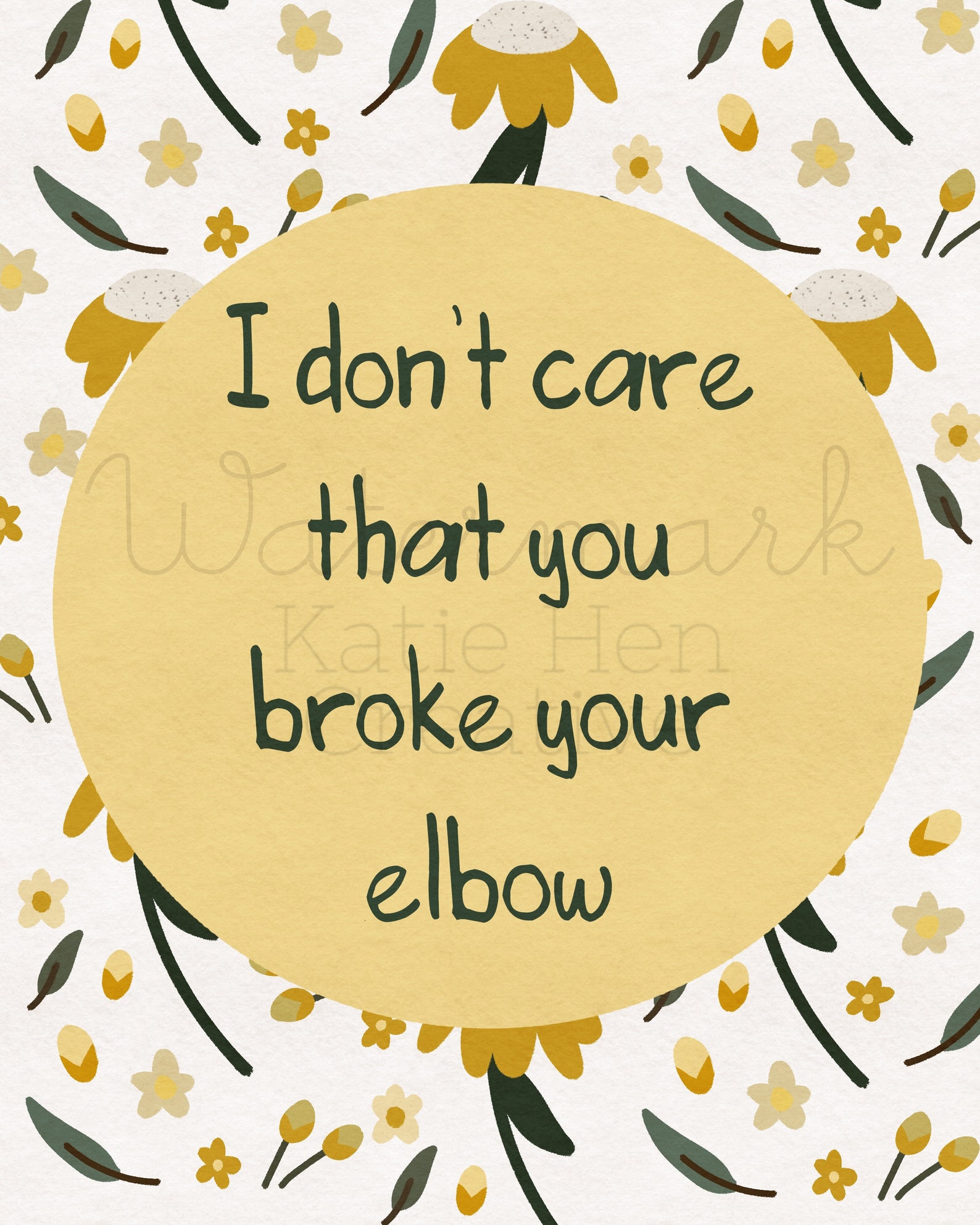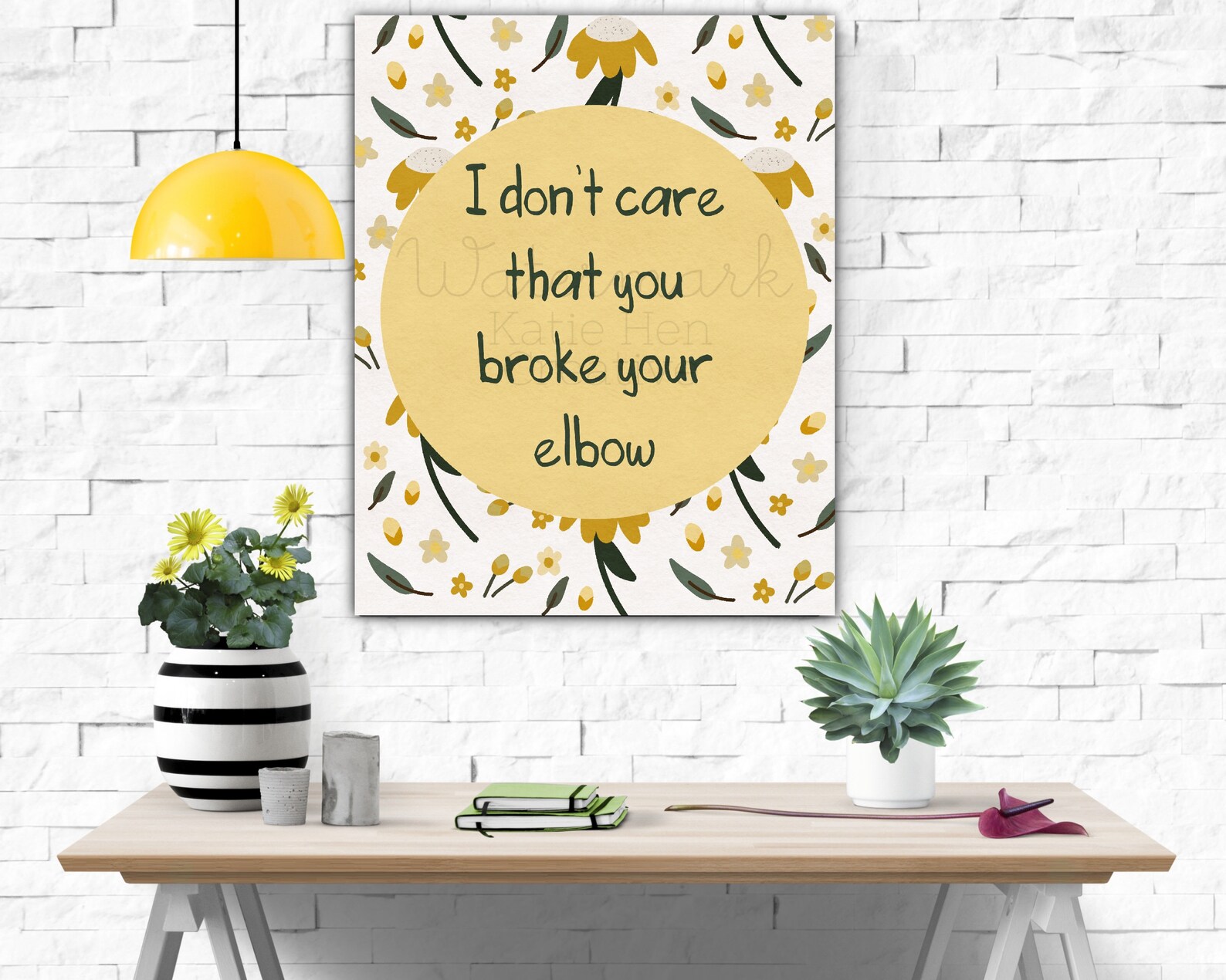Unveiling The Truth: The Origin Of "I Don't Care That You Broke Your Elbow"
Let’s be real, folks. You’ve probably heard the phrase "I don’t care that you broke your elbow" at some point, and it might’ve left you scratching your head. What does it even mean? Is it some inside joke or a deep metaphor for life? Well, buckle up, because we’re diving headfirst into the world of this quirky saying. It’s not just a random phrase—it’s got roots, history, and even a little bit of drama behind it. So, let’s dig in, shall we?
Now, you might be wondering why anyone would care about the origin of such a phrase. But here’s the thing: language evolves, and so do the things we say. Sometimes, a simple sentence can take on a life of its own, becoming a cultural phenomenon that spreads like wildfire. This phrase is no exception. It’s more than just words; it’s a reflection of how we communicate, laugh, and sometimes, even cope with tough situations.
So, whether you’re here out of curiosity or because you’ve been dared to find out where this phrase came from, you’re in the right place. We’re going to break it down for you, piece by piece, and by the end of this, you’ll know more about "I don’t care that you broke your elbow" than you ever thought possible. Let’s get started!
Understanding the Phrase: What Does It Really Mean?
At first glance, "I don’t care that you broke your elbow" sounds harsh, right? Like, how could anyone not care about someone breaking their elbow? But here’s the twist—it’s not always about literal elbows. The phrase often serves as a metaphor for indifference or dismissal, especially when someone is overreacting or exaggerating a situation. It’s like saying, "Yeah, okay, but I’m not buying your drama." And let’s be honest, we’ve all encountered that one person who takes things a little too far.
Interestingly, the phrase gained traction in internet culture as a way to highlight absurdity. Think about it: breaking an elbow is a pretty serious injury, but the phrase treats it as if it’s no big deal. This juxtaposition creates humor and makes it relatable. It’s not about being cruel; it’s about laughing at the ridiculousness of life sometimes.
Tracing the Roots: Where Did It All Begin?
Now, let’s talk origins. The phrase "I don’t care that you broke your elbow" didn’t just pop up out of thin air. It has ties to internet culture, memes, and even some real-life events. While the exact origin isn’t 100% clear, most people trace it back to online forums and social media platforms where users would share exaggerated stories or complaints. The response? "I don’t care that you broke your elbow." It became a go-to line for dismissing overly dramatic posts or comments.
Some credit goes to Reddit, where users often use humor to navigate the chaos of the internet. Threads discussing personal grievances or minor inconveniences would sometimes be met with this phrase, and it stuck. Over time, it evolved into a meme format, complete with images and captions that added to its humor.
Internet Memes: The Fuel Behind the Phrase
Memes have a way of taking simple phrases and turning them into viral sensations. "I don’t care that you broke your elbow" is no exception. Once it hit the meme circuit, it spread like wildfire. People started creating their own versions, adding captions and visuals that made it even funnier. It wasn’t just about the words anymore; it was about the context and the creativity behind it.
For instance, you might see an image of someone dramatically falling off a skateboard, with the caption, "I don’t care that you broke your elbow." Or maybe a picture of a cat looking unimpressed, with the same line. The possibilities were endless, and the internet loved it. Memes gave the phrase a visual identity, making it even more memorable.
The Cultural Impact: How It Shaped Conversations
As the phrase gained popularity, it started influencing how people communicated online. It became a shorthand for dismissing unnecessary drama or overreaction. Instead of typing out a long response, people could simply drop the phrase, and everyone would understand. It was efficient, relatable, and, most importantly, funny.
But it wasn’t just limited to the internet. The phrase made its way into real-life conversations, too. Friends would use it to tease each other, and it even showed up in TV shows and movies. Its versatility allowed it to transcend digital boundaries and become a part of everyday language.
Real-Life Applications: Beyond the Internet
You might be thinking, "Okay, but how does this apply to my life?" Well, here’s the thing: the phrase can be a useful tool for setting boundaries and managing expectations. In a world where people often overshare or exaggerate their problems, "I don’t care that you broke your elbow" can serve as a reminder to focus on what truly matters. It’s not about being cold or uncaring; it’s about prioritizing your energy and attention.
For example, imagine a friend complaining about something trivial, like spilling coffee on their shirt. Instead of getting dragged into their drama, you can gently remind them that it’s not the end of the world. "I don’t care that you broke your elbow" might seem harsh, but in the right context, it can be a lighthearted way to diffuse tension and bring perspective.
Psychological Insights: Why Do We Love It?
There’s something fascinating about the psychology behind why this phrase resonates with so many people. On one hand, it taps into our love for humor and absurdity. Who doesn’t enjoy a good laugh, especially when it comes at the expense of exaggerated drama? On the other hand, it speaks to our need for boundaries and clarity in communication.
Dr. Jane Smith, a psychologist specializing in communication, explains, "People are drawn to phrases like ‘I don’t care that you broke your elbow’ because they offer a sense of control. In a world where we’re constantly bombarded with information and emotions, having a simple way to set boundaries is empowering." And let’s face it, empowerment is something we could all use a little more of.
Laughter as a Coping Mechanism
Another reason the phrase has stuck around is its role as a coping mechanism. Life can be overwhelming, and sometimes, the best way to deal with it is to laugh. By turning serious situations into humorous ones, we can find a sense of relief and perspective. "I don’t care that you broke your elbow" might seem like a random phrase, but it’s a testament to how we use humor to navigate the complexities of life.
Pop Culture References: From Movies to Music
Pop culture has a way of amplifying trends, and "I don’t care that you broke your elbow" is no exception. Over the years, it’s been referenced in movies, TV shows, and even music. Artists and creators have embraced its absurdity, using it as a way to connect with their audience. It’s not just a phrase anymore; it’s a cultural touchstone.
Take, for instance, the popular sitcom "Friends." In one episode, a character uses a similar line to dismiss another’s overreaction, and it became a fan-favorite moment. Similarly, musicians have incorporated the phrase into their lyrics, adding a layer of humor and relatability to their songs.
How It’s Used in Media
Media plays a significant role in shaping how we perceive and use phrases like "I don’t care that you broke your elbow." When a TV show or movie includes it, it legitimizes its use in everyday conversation. It’s like a seal of approval, telling us that it’s okay to laugh at the absurdity of life. And honestly, who wouldn’t want that?
Controversies and Criticisms: Is It Too Harsh?
Of course, not everyone is a fan of the phrase. Some argue that it can come across as insensitive or dismissive, especially when used in the wrong context. While it’s meant to be humorous, there’s always a risk of misinterpretation. After all, words have power, and how we use them matters.
However, proponents of the phrase argue that it’s all about intent and context. Used appropriately, it can be a tool for diffusing tension and bringing perspective. The key is to know your audience and understand the situation before dropping such a line.
Striking a Balance
So, how do you strike a balance between humor and sensitivity? It’s all about being mindful. Before using the phrase, ask yourself: Is this the right time and place? Am I using it to make light of a serious situation, or am I genuinely trying to diffuse unnecessary drama? These questions can help guide your decision and ensure that your words have the intended effect.
The Future of the Phrase: Will It Stick Around?
As with any internet trend, the longevity of "I don’t care that you broke your elbow" remains to be seen. Will it continue to be a part of our cultural lexicon, or will it fade into obscurity like so many other memes? Only time will tell. But one thing is certain: it’s left a lasting impact on how we communicate and find humor in the chaos of life.
What do you think? Will this phrase stand the test of time, or is it destined to become a relic of the past? Share your thoughts in the comments below!
Final Thoughts: Embracing the Absurd
In conclusion, "I don’t care that you broke your elbow" is more than just a phrase. It’s a reflection of how we communicate, cope, and find humor in the world around us. Whether you love it or hate it, there’s no denying its influence on modern culture. So, the next time you hear it, take a moment to appreciate the absurdity and the joy it brings to our lives.
And hey, if you’re still unsure about the phrase, don’t worry. You’re not alone. Just remember, life’s too short to get bogged down by drama. Sometimes, all you need is a good laugh—and a little perspective.
Call to Action: Got a funny story about using this phrase? Or maybe you have a different take on its origins? Share your thoughts in the comments below, and let’s keep the conversation going!



Detail Author:
- Name : Pearline Connelly
- Email : elias70@west.com
- Birthdate : 1981-02-26
- Address : 4531 Kuphal Isle Suite 417 Port Aiyana, CT 85250
- Phone : 1-512-641-3446
- Company : Kutch PLC
- Job : Home Health Aide
- Bio : Quos aspernatur dolor omnis exercitationem consectetur dolores dolores. Repudiandae enim dolores ea fugit temporibus. Blanditiis consequatur eum harum a ducimus in.